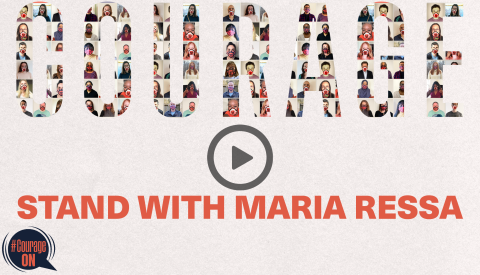
Journalists, human rights activists and other free press advocates are rallying behind pioneering journalist Maria Ressa, who was convicted of criminal cyberlibel one year ago today and faces a slew of additional charges aimed at silencing her and independent journalism in the Philippines.
Supporters are raising their voices on social media and donning masks that say #CourageON and #HoldTheLine — two of Ressa’s most popular rallying cries for fighting back. They are also signing a petition to call for an end to the legal attacks against her. The push is part of a global campaign organized by the #HoldTheLine Coalition, made up of more than 80 organizations. The coalition is co-led by the International Center for Journalists (ICFJ), the Committee to Protect Journalists (CPJ) and Reporters Without Borders (RSF).
As many parts of the world, including the Philippines, struggle to control the COVID-19 pandemic, backers of Ressa and independent press can contribute to her legal defense fund by ordering a mask here, and help raise awareness by sharing photos of themselves on social media wearing the masks. In addition, free digital masks are available for use as social media profile photos.
The #HoldTheLine coalition also released a video narrated by journalists around the world: Patricia Campos Mello of Brazil’s Folha de S.Paulo, Sewell Chan of the Los Angeles Times, Nima Elbagir of CNN, Ferial Haffajee of South Africa’s Daily Maverick, longtime PBS and CNN journalist Charlayne Hunter-Gault, Nicholas Kristof of The New York Times, and Academy Award-winning filmmaker and journalist Sharmeen Obaid-Chinoy of Pakistan.
On June 15, 2020, Ressa was convicted of “cyberlibel” — a criminal charge for which she faces up to six years in prison. Since then, two further cyberlibel charges have been brought against her and while one has been dropped, she is facing at least six other cases and charges. The internationally celebrated Filipino-American journalist could be looking at a lifetime in prison if convicted on all charges.
As Ressa herself has said, her case is “a canary in the coal mine” for independent journalism everywhere. Join us in holding the line as we fight for Ressa and independent journalism in the Philippines and beyond. #CourageON
Read this big data case study, "Maria Ressa: Fighting an Onslaught of Online Violence," to learn more about Ressa and attempts to silence her.